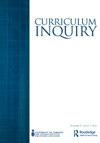Lotus and its afterlives: Memory, pedagogy and anticolonial solidarity
IF 1.6
3区 教育学
Q2 EDUCATION & EDUCATIONAL RESEARCH
引用次数: 1
Abstract
Abstract In this article we examine the Lotus: Afro-Asian Writings journal as an insurgent space that reflected Afro-Asian solidarity. We argue that Lotus constituted “infrastructures of dissent” and “infrastructures of solidarity” which were constructed between different anti-colonial movements. Though Lotus was widely circulated through different geographies, debated and discussed, there remains very little scholarly attention around its origins, impact, and the forms of solidarity it aspired to engender. There have been a number of studies on the “Bandung Spirit” and the “Tricontinental” conferences, yet there is generally less attention to the networks of artists, authors, exhibits, and magazines that discussed and debated forging insurgent solidarities under difficult circumstances. The article thus explores how cultural production was used by Afro-Asian artists to enact “creative solidarity” and the ways Lotus provided a means for cultural producers to share knowledge, theorize, and build relations across anti-colonial struggles, albeit in a space not outside the political dynamics and contradictions of the moment. We also conceptualize Lotus as an anti-colonial archive and suggest that such archives can be used pedagogically in efforts to decolonize curriculum, through a histories from below approach, to remember those occluded from history.莲花及其后生:记忆、教育学和反殖民团结
在这篇文章中,我们考察了莲花:亚非写作期刊作为一个反映亚非团结的叛乱空间。我们认为莲花构成了不同反殖民运动之间构建的“异议基础设施”和“团结基础设施”。尽管Lotus在不同的地区广泛传播,争论和讨论,但关于它的起源,影响以及它所渴望产生的团结形式的学术关注仍然很少。关于“万隆精神”和“三大洲”会议的研究有很多,但对艺术家、作家、展览和杂志的网络讨论和辩论在困难情况下锻造叛乱团结的关注通常较少。因此,本文探讨了亚非艺术家如何利用文化生产来实现“创造性团结”,以及莲花如何为文化生产者提供了一种方式,让他们在反殖民斗争中分享知识、理论化和建立关系,尽管这一空间并不在当时的政治动态和矛盾之外。我们还将Lotus概念化为一个反殖民档案,并建议这样的档案可以在教学上用于非殖民化课程的努力,通过自下而上的历史方法,记住那些被历史封锁的人。
本文章由计算机程序翻译,如有差异,请以英文原文为准。
求助全文
约1分钟内获得全文
求助全文
来源期刊

Curriculum Inquiry
EDUCATION & EDUCATIONAL RESEARCH-
CiteScore
3.10
自引率
17.60%
发文量
37
期刊介绍:
Curriculum Inquiry is dedicated to the study of educational research, development, evaluation, and theory. This leading international journal brings together influential academics and researchers from a variety of disciplines around the world to provide expert commentary and lively debate. Articles explore important ideas, issues, trends, and problems in education, and each issue also includes provocative and critically analytical editorials covering topics such as curriculum development, educational policy, and teacher education.
 求助内容:
求助内容: 应助结果提醒方式:
应助结果提醒方式:


